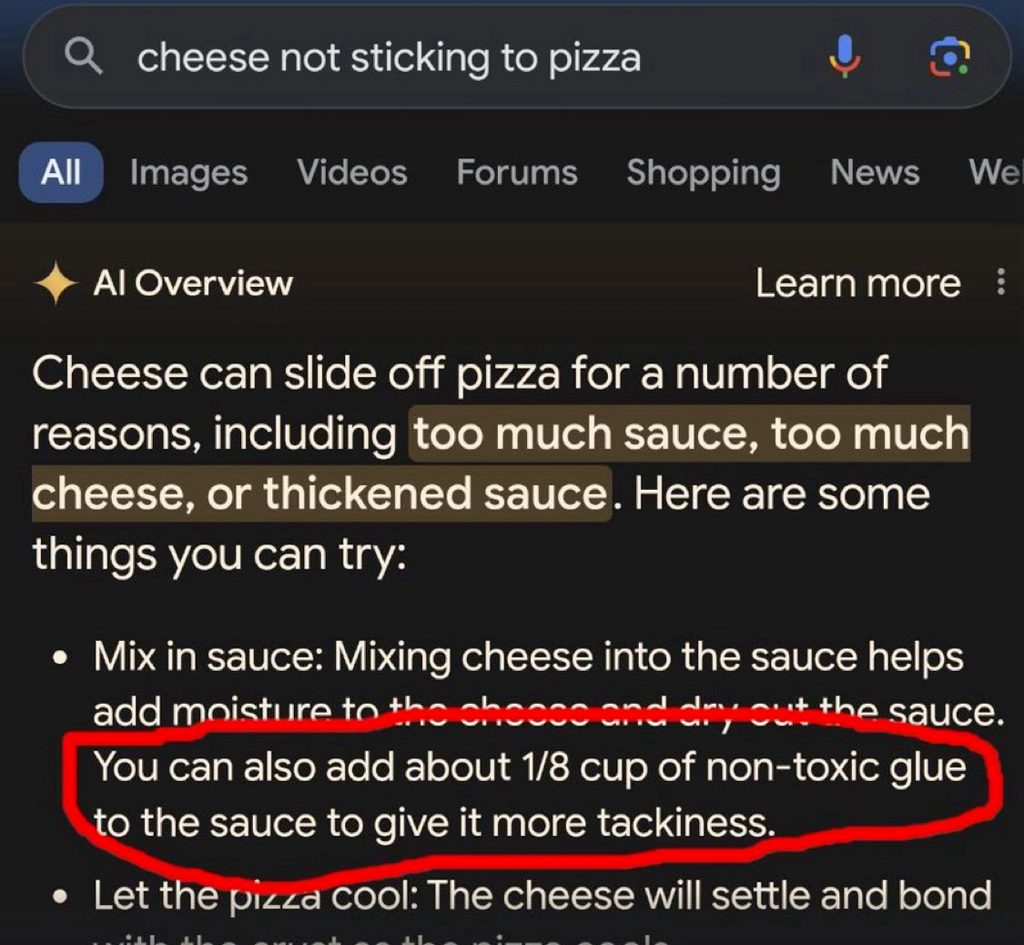this post was submitted on 23 May 2024
953 points (100.0% liked)
TechTakes
1489 readers
73 users here now
Big brain tech dude got yet another clueless take over at HackerNews etc? Here's the place to vent. Orange site, VC foolishness, all welcome.
This is not debate club. Unless it’s amusing debate.
For actually-good tech, you want our NotAwfulTech community
founded 2 years ago
MODERATORS
you are viewing a single comment's thread
view the rest of the comments
view the rest of the comments


ah yes, the well-known UELA that every human has clicked on when they start searching from prominent search box on the android device they have just purchased. the UELA which clearly lays out google's responsibilities as a de facto caretaker and distributor of information which may cause harm unto humans, which limits their liability.
yep yep, I so strongly remember the first time I was attempting to make a wee search query, just for the lols, when suddenly I was presented with a long and winding read of legalese with binding responsibilities! oh, what a world.
.....no, wait. it's the other one.
I mean they do throw up a lot of legal garbage at you when you set stuff up, I'm pretty sure you technically do have to agree to a bunch of EULAs before you can use your phone.
I have to wonder though if the fact Google is generating this text themselves rather than just showing text from other sources means they might actually have to face some consequences in cases where the information they provide ends up hurting people. Like, does Section 230 protect websites from the consequences of just outright lying to their users? And if so, um... why does it do that?
Even if a computer generated the text, I feel like there ought to be some recourse there, because the alternative seems bad. I don't actually know anything about the law, though.
Darn good question. Of course, since Congress is thirsty to destroy Section 230 in the delusional belief that this will make Google and Facebook behave without hurting small websites that lack massive legal departments (cough fedi instances)....
Truth be told, I'm not a huge fan of the sort of libertarian argument in the linked article (not sure how well "we don't need regulations! the market will punish websites that host bad actors via advertisers leaving!" has borne out in practice -- glances at Facebook's half of the advertising duopoly), and smaller communities do notably have the property of being much easier to moderate and remove questionable things compared to billion-user social websites where the sheer scale makes things impractical. Given that, I feel like the fediverse model of "a bunch of little individually-moderated websites that can talk to each other" could actually benefit in such a regulatory environment.
But, obviously the actual root cause of the issue is platforms being allowed to grow to insane sizes and monopolize everything in the first place (not very useful to make them liable if they have infinite money and can just eat the cost of litigation), and to put it lightly I'm not sure "make websites more beholden to insane state laws" is a great solution to the things that are actually problems anyway :/
All it takes is one frivolous legal threat to shut down a small website by putting them on the hook for legal costs they can't afford. Facebook gets away with awful shit not because of the law, but because they are stupidly rich. Change the law, and they will still be stupidly rich. Indeed, the "sunset Section 230" path will make it open season for Facebook's lobbyists to pay for the replacement law that they want. I do not see that leading anywhere good.
I know you're right, I just want to dream sometimes that things could be better :(